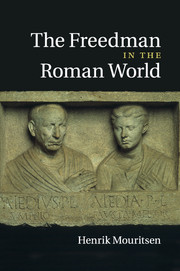Book contents
1 - Introduction
Approaching Roman freedmen
Published online by Cambridge University Press: 21 January 2011
Summary
Adding another volume to the ever-expanding mass of scholarly literature on the ancient world requires some justification. But in the case of the Roman freedman there does seem to be a surprising gap; for although most works on Roman history or culture make passing references to freedmen in some context or other, few of them have tried to grasp the nature of Roman manumission and its wider function within Roman society. Attempts to deal comprehensively with the question of Roman manumission are relatively rare, a notable exception being Keith Hopkins' chapter in Conquerors and Slaves. Moreover a general synthesis of the Roman freedman, covering both republic and empire, has never been ventured, and the last book-length treatment of the imperial period was Duff's problematic work of 1928. By contrast, the republic is much better served with Treggiari's fundamental monograph (1969) and Fabre's detailed study of the patron–freedman relationship (1981). Most dedicated studies have dealt with specific, often highly technical aspects of manumission, particularly the legal ones, or with individual groups of freedmen, above all those of the emperor.
The apparent reluctance to tackle the phenomenon as a whole merits closer consideration. For once the reason cannot be lack of evidence, since few groups in Roman society are more fully documented or covered by such a diverse range of sources, legal, literary, epigraphic, and documentary. In fact, the sheer scale of the evidence may have militated against a synthetic approach, not least in the current age of increasing academic specialisation.
Information
- Type
- Chapter
- Information
- The Freedman in the Roman World , pp. 1 - 9Publisher: Cambridge University PressPrint publication year: 2011
